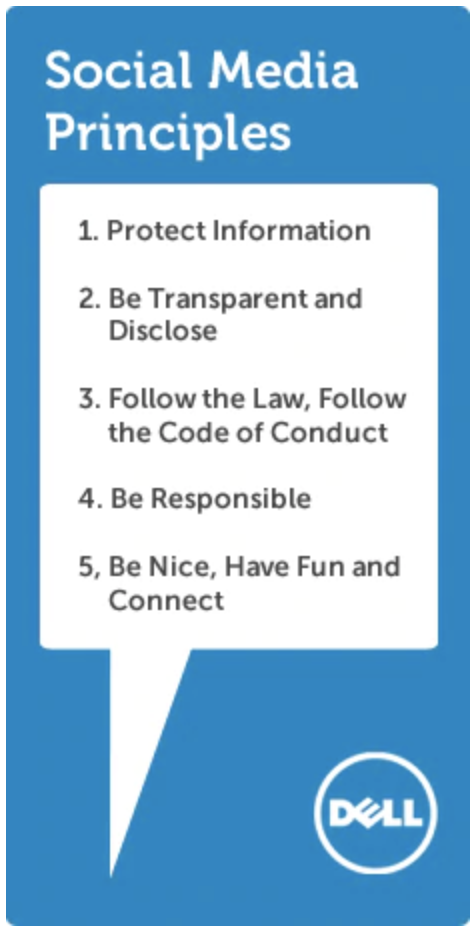The first rule of social media marketing is: you’re responsible for anything that ends up on your business page.
Regardless of how the inappropriate or potentially damaging content got on Facebook, Twitter, LinkedIn or Instagram (a careless employee, a lewd commentor, etc.) – you’re the one who has to deal with the fallout.
Depending on your industry, the aftermath could potentially include:
- Inconsistent or poor branding.
- Really angry users.
- Account restrictions.
In more extreme cases, you may even be exposed to legal action.
And to be perfectly clear, this is true of all times – not just during a public health crisis.
If your brand doesn’t already have a social media policy, it most definitely should.
Let’s examine why.
What is a social media policy?
A social media policy is an organization’s way of governing how its social media managers, employees and other users behave on social media. The policy’s guidance helps a company, its staff and followers avoid posting content on social networks that could lead to legal liabilities, reputational harm or inconsistent branding.
In this sense, there are really 2 owners of your social media policy:
- Human resources: HR will typically develop a company social media policy around how employees engage one another and the business via their personal accounts, whether business pages can tag employees in posts, and other staff privacy- and conduct-centric matters.
- Marketing: Marketing is usually more concerned with voice, branding, messaging and engagement on social media, as opposed to the code of conduct.
The two aren’t always mutually exclusive. Some companies include rules in the employee handbook about how brand social media managers engage with employees’ personal accounts.
Who needs a social media policy and why?
Every company that has active social media accounts, and even some that don’t but have employees who use social media, should have a policy.
The contents of that policy will vary significantly depending on your market.
Government agencies, health care providers, K-12 educators, and news and media outlets might have more rigid policies formally documented in an employee handbook. These organizations are more likely to use social media to assist them in providing a public service.
Private companies, on the other hand, are usually more concerned with their market and will lean heavily on the values of that market. This means they might feel more at liberty to editorialize and use humor than, say, the U.S. Department of Education.
Thousands of schools use positive behavioral interventions and supports to build children’s social-emotional-behavioral skills and reduce challenging behaviors. The Center on PBIS offers recommendations for families/caregivers to implement PBIS at home.https://t.co/Dt83YYJy7d pic.twitter.com/ZnIOR6lBhi
— U.S. Department of Education (@usedgov) April 3, 2020
As for the “why” of having a social media policy? The reasons are pretty straightforward:
- Posting guidance: Your social media managers and your employees are better off knowing what they should and should not post on social media. The goal here is by no means to limit workers’ speech, but rather, to lay some ground rules about how they speak on the brand’s behalf.
- Employee turnover: It’s possible that your current roster of social media managers and employees are fully ingrained in your company culture and have pieced together what is and isn’t OK when it comes to posting on social media. But what happens when they leave, or when your business expands? Written documentation can help pass your policy down to future employees.
What should be covered in a social media policy?
At a high level, every social media policy should cover 3 core areas:
1. Branding
Just like your website, blog and the rest of your digital content, your social media sites are your properties. You need to make sure they adequately represent your brand, its core values and its style. You also have to align these policies with social networks’ user agreements.
2. Legal and administrative issues
A social media policy is necessary for advising social media marketing managers, employees and users on legal and administrative dos and don’ts, like violating someone’s privacy, or posting defamatory, inappropriate or offensive content.
3. The line between the personal and the professional
How will you distinguish between a company’s opinion and the opinion of a representative posting on his or her personal profile? Do you have a policy for employees about using social media for internal communications or airing their workplace grievances? What about user-generated content – have you made it clear that commenters do not speak for your brand?

A company social media policy template
To make it easy for you to create a corporate social media policy, we’ve put together an approximate template below.
Feel free to make each of these your own in some way. For instance, instead of just saying “legal,” you might come up with something a little more voicey and suited to your brand (e.g., “Don’t end up in ‘custardy’” instead of “legal” if you’re an ice cream company).
Legal
Remind employees to follow the law when posting on behalf of the brand, or on their personal accounts – for example, by not:
- Violating employee, client or any other user’s privacy by posting personal information that may be protected under certain regulations.
- Posting libelous content (meaning it defames an individual or company).
- Posting content that shows them breaking the law.
Conduct
Hold employees to a certain standard for how they conduct themselves – especially when speaking for your brand – but also as representatives of your company. This means encouraging employees to respect everyone on social media by:
- Not engaging in antagonistic or creepy social media activity.
- Being ethical and honest, meaning not misrepresenting who you are in order to exploit others.
- Not discriminating against people because of their race, sex, religion, sexual orientation, gender identity, citizenship status, disability, etc.
- Encouraging employees to be careful about what they share for their own safety.
- Removing user-generated content on company social media pages that violates legal or conduct codes.
Intellectual property
There is literally no reason for your social media manager and/or employees to disclose certain company information, including:
- Trade secrets and intellectual property.
- Information about your company’s internal operations.
- Financial or customer data.
Branding
Lay some ground rules about how your company is represented on social media by your marketing team, but also by any employees engaging with or talking about your brand on their personal profiles. This means:
- When posting about the company on personal profiles, state that it’s your opinion to make it clear that you’re not speaking for the company.
- When posting content to the company accounts, adhere to:
- Voice and tone guidelines.
- Visual branding guidelines.
- Formatting and hashtag guidelines.
- Grammar and style guidelines.
Remember: Consistency is a crucial element of social media branding. Check out this blog post by my colleague Alex Cox to learn everything there is to know about social media branding.
Should you post your social media policy online?
That’s 100% up to you.
Some companies like Best Buy, Adidas, Dell, Walmart and many others have chosen to share their social media policies with the public.
But if you have a relatively modest following and are a smaller employer, you may not feel as much urgency to share your policy with the world.
Whatever you do, just make sure you have a policy, and that you’ve shared it with your employees.
A footnote about your COVID-19 social media policy
Now that we’ve gone through all the trouble of explaining what a social media policy is and how to create one for your company, we need to add kind of a big footnote.
Not all of your social media guidelines will apply during a pandemic or other crisis.
For example:
- You may need to take a tonal shift to acknowledge what your audience is going through at this time.
- You may need to expand upon some of the things your brand should avoid talking about or referencing during this time.
- You definitely should take some time to integrate your social media policy with your positioning statement (who do you want to be during this time and how will your social media branding efforts convey that identity?).
There’s no playbook for social media marketing during a pandemic, but we put together a blog post with some guidance to work from. Use it to help inform your social campaigns during this public health crisis.
From all of us here at Brafton, stay healthy, stay strong and stay safe.





